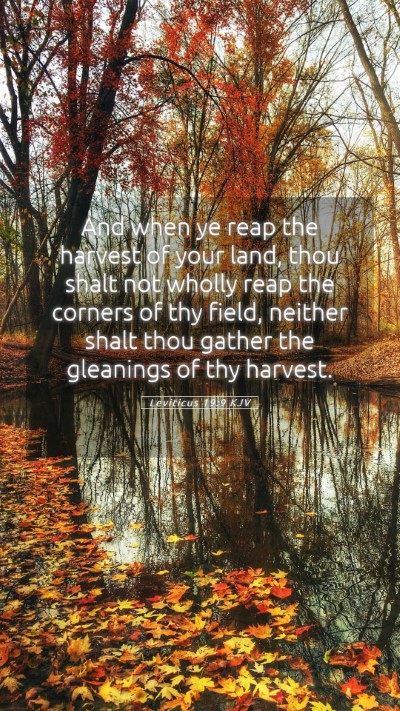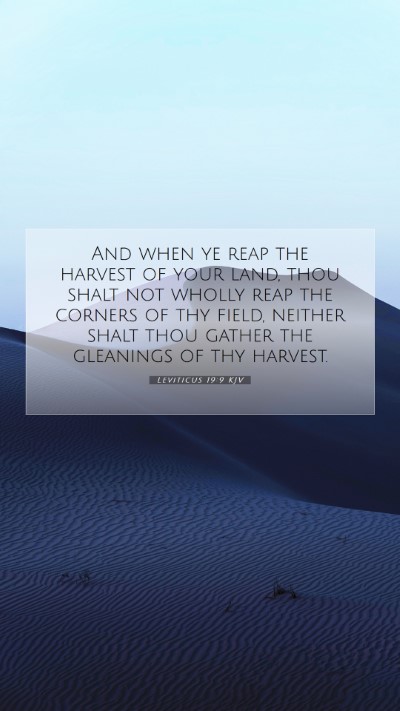Bible Verse Commentary: Leviticus 19:9
Verse: "When you reap the harvest of your land, you shall not wholly reap the corners of your field, nor shall you gather the gleanings of your harvest."
Meaning and Interpretation
The verse in Leviticus 19:9 addresses the ethical and social responsibilities of the Israelites regarding their agricultural practices. The Lord commands them to leave portions of their harvest for the poor and the stranger, emphasizing the need for compassion and charity within the community.
- Caring for the Less Fortunate: This verse sets in motion a principle of reserving a part of one’s resources for those in need, demonstrating God’s concern for social justice (Matthew Henry).
- Divine Provision: The act of leaving corners of the field and gleanings acknowledges God's provision, as He supplies enough for the owner, while also providing for the less fortunate (Albert Barnes).
- Community Responsibility: The commandment nurtures a spirit of community among the Israelites, reminding them that everyone has a role in supporting their neighbors, particularly those that are vulnerable (Adam Clarke).
Insights from Commentaries
These insights highlight the significance of this verse within the broader context of Biblical teachings on generosity and love for neighbors:
- Matthew Henry: Henry emphasizes that this law not only promotes charity but also protects the dignity of the poor, allowing them to work for their sustenance rather than relying solely on handouts.
- Albert Barnes: Barnes notes that this law exemplifies God's desire for His people to model justice and mercy, reflecting His character through their actions.
- Adam Clarke: Clarke points out that this practice fosters a sense of gratitude for God’s blessings and encourages a communal trust in God’s provision.
Application to Daily Life
The teachings in Leviticus 19:9 can be applied to modern life through practices of generosity, responsible stewardship, and community support. Here are ways to understand its application:
- Generosity: Individuals can practice generosity by sharing resources with those in need, whether through food banks, community services, or kind acts.
- Community Involvement: Engaging in community service and outreach programs can fulfill this commandment by actively participating in the alleviation of poverty.
- Mindfulness in Consumption: Recognizing the abundance we have and being mindful not to waste resources aligns with the spirit of this verse.
Cross References
For a deeper understanding, consider exploring the following related scriptures:
- Deuteronomy 24:19: Reinforces the principle of leaving the gleanings for the poor.
- Ruth 2:2-3: An example of this law in practice through Ruth’s actions.
- Matthew 25:35-36: Jesus’ teaching on serving those in need directly connects to this principle of charity.
Conclusion
Leviticus 19:9 serves as a timeless reminder of the need for compassion and responsibility towards those less fortunate in our communities. By adhering to these teachings, individuals can actively participate in God's vision of communal support and generosity, enhancing both personal growth and societal welfare.
Further Bible Study Resources
To expand your understanding, consider using the following:
- Online Bible Study Courses: Engage in courses that provide deeper insights into the Old Testament laws and their implications for today.
- Bible Study Groups: Join local or online groups to discuss interpretations and applications of Biblical principles.
- Bible Study Tools: Utilize commentaries, dictionaries, and other resources to enhance your scripture analysis and personal study.


